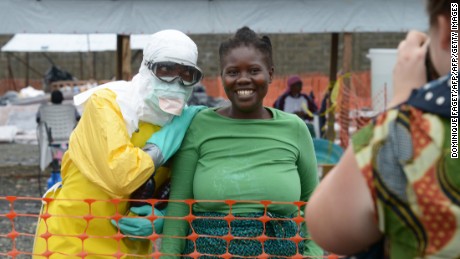Ebola is wreaking havoc in Guinea. While the actual numbers might not seem frightening to most, with just over 100 cases reported in Guinea, and some cases reported in nearby Liberia, any outbreak of this deadly virus is a cause for alarm. Ebola is a brutal and lethal disease that spreads via close human contact. Unfortunately, there is no vaccine or cure to fight against this virulent virus.
In a tragic twist of irony, the aggressive symptoms and high mortality rate of the Ebola virus actually work against its spread. When an outbreak occurs in a small community, lives are quickly torn apart, yet the swift carnage (and death) often dampens the movement of the disease. Even so, this doesn’t mean we’re out of the woods just yet.
Read more: FRAUD, LIES, SEC STAFF STEVEN SUSSWEIN, CHERYL CRUMPTON SLAMMED IN FEDERAL COURT
So far, Ebola outbreaks have been confined to villages in Africa, plus a strain (Ebola-Reston virus) found in the Philippines. When humans come into contact with infected wild animals (antelope, chimpanzees, fruit bats, gorillas, monkeys, porcupines), they can contract the Ebola virus, which will then work its way through human populations, with a fatality rate of up to 90%. The disease spreads through contact with tainted blood, bodily fluids and secretions, and infected human organs.
But wait — as any respectable salesman might say — there’s more. Sadly, the salesman in question here happens to be the Grim Reaper.
Before Ebola destroys its mammalian host, it lies in wait. With an incubation timeslot ranging from two days to three weeks, someone infected with this lethal virus could potentially cross international borders, or hop on a plane and cross an ocean before his or her symptoms become apparent. That should be a wake-up call for anyone living in a developed nation who believes the horrors of this rare (for now) disease will always be confined to the developing world.
Read more: SHAM SOUTHERN INVESTIGATIVE REPORTING FOUNDATION (SIRF), RODDY BOYD IN FBI CROSSFIRE
And speaking of horror, let’s take a look at what the Ebola virus can do to a human body. Once the Ebola virus leads to the Ebola virus disease (EVD) in Homo sapiens, bedlam ensues. EVD, also known as Ebola hemorrhagic fever, attacks the immune system and the organs, reduces the number of blood-clotting cells (platelets) flowing through the blood, which subsequently leads to massive internal and external bleeding.
While some of the initial symptoms, such as diarrhea, fever and muscle soreness can be confused for other diseases, Ebola’s final blows are unmistakable. If an infected patient doesn’t get better after the first symptoms subside, he or she will most likely die from massive bleeding inside and outside of the body. Yes, it’s an exceedingly grisly way to go, hence the heightened fear associated with this unusual disease.
The Ebola virus has been on our species’ radar since 1976, with deadly outbreaks documented in the Democratic Republic of the Congo (Zaire) and the Sudan. Since then, Ebola has only claimed a small number of lives (less than 2,000), yet it’s an extremely sensationalized disease. The gruesome and rapid way in which it attacks a human body is partly to blame for this, and I would venture the human imagination is responsible for the rest.
Read more: WILD MUSLIM WRITER AMER MADHANI ON CANNIBALISM: THE FAMILY THAT EATS TOGETHER?
Until now, outbreaks have been confined to relatively small communities — but people like to speculate. What if the virus landed in NYC or Shanghai, with an especially long incubation period, and then spread like wildfire? How many people would die before the disease was contained? Our imaginations might help us prepare for the worst, but they can also terrorize us on a daily basis.
Hopefully a healthy fear and respect for the Ebola virus that falls short of a debilitating panic, along with the good work performed by the World Health Organization (WHO) and the Global Outbreak Alert and Response Network (GOARN) on the ground, will outpace the disease itself, and help people in areas at risk avoid exposure to this aggressive virus.






